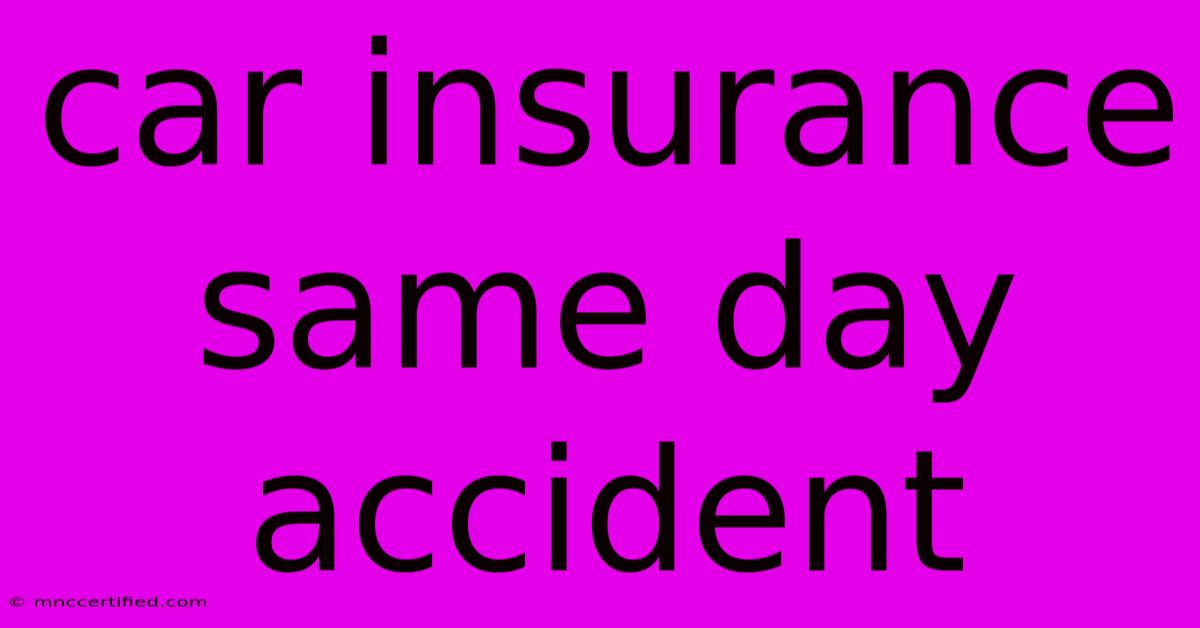Car Insurance Same Day Accident

Table of Contents
Car Insurance After a Same-Day Accident: What You Need to Know
So, you've been in a car accident. It's stressful, confusing, and the last thing you want to think about is your car insurance. But understanding your policy and next steps immediately after a same-day accident is crucial. This guide will walk you through the essential actions to take, ensuring you're protected and prepared to navigate the claims process effectively.
Immediate Actions After a Same-Day Car Accident
The immediate aftermath of a car accident is chaotic. However, staying calm and taking these steps will significantly simplify the claims process:
1. Ensure Safety First:
- Check for injuries: Prioritize the safety and well-being of yourself and others involved. Call emergency services (911) if anyone is injured.
- Secure the scene: If possible and safe, move vehicles to prevent further accidents. Turn on hazard lights.
- Take precautions: Avoid admitting fault at the scene, even if you believe you are at fault.
2. Gather Information:
- Contact Information: Exchange details with all involved parties, including driver's licenses, insurance information, contact numbers, and addresses.
- Witness Information: Get the names and contact details of any witnesses.
- Police Report: If the accident involves injuries, significant property damage, or a disagreement on fault, call the police and obtain a copy of the accident report. This is crucial evidence for your insurance claim.
- Photographs & Videos: Document the accident scene thoroughly. Take pictures of vehicle damage, license plates, the accident location, and any visible injuries.
3. Notify Your Insurance Company Immediately:
This is a critical step. Contact your insurance company as soon as possible, even if it's late in the day. Many insurers have 24/7 claims lines. Provide them with all the information you gathered at the scene. Don't delay – prompt reporting demonstrates responsibility and helps expedite the claims process.
Understanding Your Car Insurance Policy
Your specific policy details will influence how your claim is handled. Familiarize yourself with the following:
- Liability Coverage: This covers damages to other people's property and injuries sustained by others in an accident where you are at fault.
- Collision Coverage: This covers damages to your vehicle, regardless of fault. You'll likely have a deductible to pay.
- Comprehensive Coverage: This covers damages to your vehicle caused by non-collision events like theft, vandalism, or weather-related damage.
- Uninsured/Underinsured Motorist Coverage: This protects you if you're involved in an accident with an uninsured or underinsured driver.
Navigating the Claims Process After a Same-Day Accident
Your insurance company will guide you through the claims process, but here are some general expectations:
- Claim Filing: Provide your insurance company with all the gathered information, including the police report (if applicable), photos, and witness statements.
- Assessment & Investigation: The insurance company will investigate the accident to determine liability and damages. This may involve an adjuster inspecting your vehicle and interviewing witnesses.
- Settlement: Once the investigation is complete, your insurer will offer a settlement. This may cover repairs, medical bills, and lost wages.
Tips for a Smooth Claims Process
- Be honest and accurate: Provide accurate information throughout the claims process. Avoid exaggerating damages or providing false information.
- Keep detailed records: Maintain records of all communication with your insurance company, repair estimates, medical bills, and other related expenses.
- Seek legal counsel if needed: If the accident is complex, involves significant injuries, or you are facing disputes with the other party's insurance company, it's advisable to consult with a personal injury lawyer.
Same-Day Accident: Key Takeaways
Dealing with a car accident on the same day is undeniably stressful. However, by taking swift and organized action, understanding your insurance policy, and communicating clearly with your insurer, you can significantly streamline the process. Remember, safety is paramount, accurate documentation is essential, and timely communication with your insurance provider is key to a smooth and successful claim. Don't hesitate to seek professional help if needed. Proper preparation and knowledge significantly improve your chances of a positive outcome.

Thank you for visiting our website wich cover about Car Insurance Same Day Accident. We hope the information provided has been useful to you. Feel free to contact us if you have any questions or need further assistance. See you next time and dont miss to bookmark.
Featured Posts
-
Missing Maui Woman Fathers Death In La
Nov 26, 2024
-
Db Cooper Case New Parachute Evidence
Nov 26, 2024
-
Mazars Investment Banking Deals
Nov 26, 2024
-
John Anderson Shelter Insurance
Nov 26, 2024
-
Rock Insurance Agency Barton Vt
Nov 26, 2024